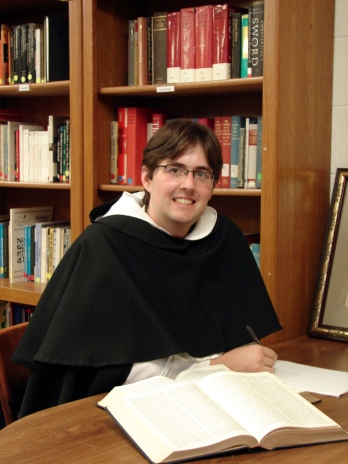This post is part of a series of interviews with our incoming class for the “Virtue, Happiness, & Self-Transcendence” 2017 Summer Seminar. James Dominic Rooney is Dominican Priest and graduate student in Philosophy at Saint Louis University. Valerie Wallace is Associate Director, Communications, for Virtue, Happiness, & the Meaning of Life.
Valerie Wallace: Where are you from?
James Dominic Rooney: I am from Ohio, originally, but more recently of St. Louis, MO.
VW: What are your research areas? Why?
JDR: I am interested in metaphysics, Eastern and Western medieval philosophy, and philosophy of religion.
I’ve always been fascinated by the most general, fundamental questions of philosophy, such as the nature of casuality, what exists, or basic truths we often take for granted. Much of this explains my interest in metaphysics. Metaphysics as I conceive of it follows on Aristotle and Thomas Aquinas: it is the science of being-as-being, or the structure of reality. While this can seem esoteric, empirical science appears to require metaphysical assumptions, and I am interested in how we should decide between metaphysical theories that might have ramifications for fundamental physics (quantum mechanics, etc.) or other sciences like biology.
Because of my interests in metaphysics, I have found a lot of interesting resources in medieval philosophy both in the Latin West and in China (Confucianism). Both of these traditions have a view of metaphysics as the science of wisdom, knowing the ultimate causes of everything. We tend to divide theoretical and practical concerns far apart, so that scientific inquiry is neither morally good nor bad, and is just beside the point of leading a fulfilled life. But I think the Chinese and Latin philosophers point to a different vision of wisdom: philosophy (and the wisdom it seeks) is not only a kind of theoretical knowledge, but importantly connected to a way of life. This perspective seems to me often forgotten or unpracticed in contemporary philosophy, let alone society. I think we could all benefit from rediscovering how to acquire wisdom.
VW: What are you most looking forward to about this summer’s seminar?
JDR: I look forward to having the opportunity not only to learn from some of the top scholars in their respective fields, but to be able to have personal discussion with them alongside other graduate students. The best and most lively work in philosophy seems to me to originate in these kind of discussions.
VW: What are your non-academic interests?
JDR: I am fond of art-house movies, calligraphy, bonsai trees, skiing, and being generally outdoors. But my aesthetic interests are really just a mature compensation for my love of computer games.
